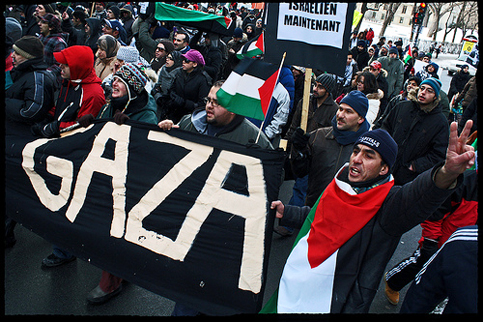Israel’s attack on the Gaza Strip continues, a major military invasion unleashed by the most advanced military power in the Middle East against the besieged Palestinians in Gaza; 1.5 million people locked-in by land and sea in open collusion between Israeli and Egyptian authorities.
As hundreds of Palestinians have been killed in Israeli air strikes, protests in solidarity with Gaza have rapidly swept across the globe, a striking contrast to the resounding silence or straight-up complicity expressed by high-level politicians from the Middle East, to Europe and to North America.
Solidarity with Gaza is strongly present at a popular level internationally, on the streets of the world, while structures of political power, from the European Union (EU) to the UN have failed to force Israel to respect international law as bombs continue to rain down on civilians throughout the Gaza Strip – an expression of profound failure from the very institutions that purport to posses an ability to enforce international law and order.
International law or UN resolutions are certainly critical points of reference on Palestine, however in current circumstances they stand only as showcase diplomatic words on paper in contrast to the reality on the ground in Gaza.
UN officials at the highest levels have softly called for an immediate ceasefire, but beyond words have taken no binding actions to sanction Israel; as a result, Israel continues to bomb.
Protests occurring in the upcoming days must call on international institutions and governments to sanction Israel in response to the attack on Gaza. Such grassroots pressure can potentially play a role in unravelling Israel’s cloak of international legitimacy woven by bilateral diplomatic political and economic relations internationally.
Despite the bloodshed in Gaza, the calculated violations of international law, the Israeli government has paid no serious price. Billions in foreign aid continues to flood Israeli state coffers, while governments around the world maintain bilateral ties.
As bombs are falling over Palestine the EU maintains an economic partnership agreement with Israel, Canada maintains a bilateral trade and security accord, agreements signed on conditions that Israel respect human rights legislation and international law. Today human rights in Gaza are literally on fire while such bilateral agreements are maintained.
Israel’s bombardment will halt once serious international pressure is asserted. Governments and institutions internationally must be pressured through protest to cut economic and diplomatic ties with Israel. Once faced with the spectre of international isolation Israel will be forced to reconsider the current military campaign in Gaza and ongoing efforts to colonize Palestine.
It is popular protest and grassroots organizing, led by movements for social justice, which has the ability to conduct political winds that will lead to the eventual isolation of Israel, not international institutions or governments.
In Cairo protests have been particularly inspiring, as thousands of Egyptians have taken to the streets this past week to protest the Israeli siege but also to confront institutions of political power in Egypt, which under President Mubarak maintain a direct responsibility for the deteriorating humanitarian catastrophe in the Gaza Strip.
Egypt has thus far refused to open the border with Gaza, aside from allowing symbolic amounts of humanitarian aid, as the Egyptian government has actively maintained the blockade on Gaza. In response protesters in Cairo have taken to the streets, sparks of the grassroots movement working to overturn the U.S.-backed government in Egypt, a nation with widespread poverty; according to U.N. statistics one in every five Egyptians cannot meet their basic living needs.
In Jordan thousands have gathered in Amman throughout the past week in solidarity with Gaza, but also to denounce the Jordanian government that maintains deep political and economic ties with Israel, despite widespread opposition to normalization at a grassroots level in the country.
Across the Middle East protests have taken a critical step beyond denouncing Israel’s military actions towards an open confrontation with governments in the Arab world that stand complicit with Israeli war crimes.
Now an open question is whether the protests denouncing state complicity with Israel across the Middle East will sustain beyond the current crisis and ignite a serious challenge to U.S.-backed regimes in the region, which are critical to normalizing Israel’s colonization of Palestine.
Without a radical change at the highest levels of state power across the Middle East, from Jordan, to Egypt, to Saudi Arabia, liberation for Palestine remains a distant possibility. All political futures are deeply intertwined in the region and the struggle for Palestine extends beyond the borders of 1948 to all surrounding nations.
U.S.-backed torture programs in the prison cells of Egypt, Jordan and Iraq are intimately linked to Palestine, as the active suppression of popular movements for social change in the Middle East is a necessary element to ensuring Israel’s colonial project over Palestine and U.S. presence in the region.
Beyond the Middle East protests in solidarity with Gaza that will continue in the next weeks must respond to the current bombardment while building the long term campaign for boycott, divestment and sanctions to be imposed on the Israeli government.
It is the boycott campaign, as organized at a popular level, which can build towards the eventual isolation of Israel internationally.
Just as the apartheid regime in South Africa withered away, isolated from the international community after decades of grassroots campaigning and solidarity work, Israel’s colonial occupation over Palestine can face a serious challenge when confronted by a serious international boycott campaign and a Middle East region defined by social and economic justice, not by dictatorships, kingdoms and torture cells.
Keys to cracking Israeli apartheid are within grassroots movement for social justice in the Middle East and around the world, not within the halls of state power and international institutions defined by hollow resolutions and empty rhetoric.
Stefan Christoff is a contributor to rabble.ca and an organizer with Tadamon!, a collective working in solidarity with movements for social justice in the Middle East.
—



